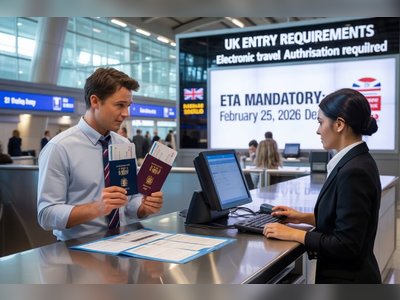Secret Documents Show How Criminals Use Famous Banks To Finance Terror And Death
A huge trove of secret government documents reveals for the first time how the giants of Western banking move trillions of dollars in suspicious transactions, enriching themselves and their shareholders while facilitating the work of terrorists, kleptocrats, and drug kingpins.
And the US government, despite its vast powers, fails to stop it.
Today, the FinCEN Files - thousands of “suspicious activity reports” and other US government documents - offer an unprecedented view of global financial corruption, the banks enabling it, and the government agencies that watch as it flourishes. BuzzFeed News has shared these reports with the International Consortium of Investigative Journalists and more than 100 news organizations in 88 countries.
These documents, compiled by banks, shared with the government, but kept from public view, expose the hollowness of banking safeguards, and the ease with which criminals have exploited them. Profits from deadly drug wars, fortunes embezzled from developing countries, and hard-earned savings stolen in a Ponzi scheme were all allowed to flow into and out of these financial institutions, despite warnings from the banks’ own employees.
Money laundering is a crime that makes other crimes possible. It can accelerate economic inequality, drain public funds, undermine democracy, and destabilize nations - and the banks play a key role. “Some of these people in those crisp white shirts in their sharp suits are feeding off the tragedy of people dying all over the world,” said Martin Woods, a former suspicious transactions investigator for Wachovia.
Laws that were meant to stop financial crime have instead allowed it to flourish. So long as a bank files a notice that it may be facilitating criminal activity, it all but immunizes itself and its executives from criminal prosecution. The suspicious activity alert effectively gives them a free pass to keep moving the money and collecting the fees.
The Financial Crimes Enforcement Network, or FinCEN, is the agency within the Treasury Department charged with combating money laundering, terrorist financing, and other financial crimes. It collects millions of these suspicious activity reports, known as SARs. It makes them available to US law enforcement agencies and other nations’ financial intelligence operations. It even compiles a report called “Kleptocracy Weekly” that summarizes the dealings of foreign leaders such as Russian President Vladimir Putin.
What it does not do is force the banks to shut the money laundering down.
In the rare instances when the US government does crack down on banks, it often relies on sweetheart deals called deferred prosecution agreements, which include fines but no high-level arrests. The Trump administration has made it even harder to hold executives personally accountable, under guidance by former deputy attorney general Rod Rosenstein that warned government agencies against “piling on.”
But the FinCEN Files investigation shows that even after they were prosecuted or fined for financial misconduct, banks such as JPMorgan Chase, HSBC, Standard Chartered, Deutsche Bank, and Bank of New York Mellon continued to move money for suspected criminals.
Suspicious payments flow around the world and into countless industries, from international sports to Hollywood entertainment to luxury real estate to Nobu sushi restaurants. They filter into the companies that make familiar items from people’s lives, from the gas in their car to the granola in their cereal bowl.
The FinCEN Files expose an underlying truth of the modern era: The networks through which dirty money traverse the world have become vital arteries of the global economy. They enable a shadow financial system so wide-ranging and so unchecked that it has become inextricable from the so-called legitimate economy. Banks with household names have helped to make it so.
BuzzFeed News’ investigation shows that:
Standard Chartered moved money on behalf of Al Zarooni Exchange, a Dubai-based business that was later accused of laundering cash on behalf of the Taliban. During the years that Al Zarooni was a Standard Chartered customer, Taliban militants staged violent attacks that killed civilians and soldiers.
HSBC’s Hong Kong branch allowed WCM777, a Ponzi scheme, to move more than $15 million even as the business was being barred from operating in three states. Authorities say the scam stole at least $80 million from investors, mainly Latino and Asian immigrants, and the company’s owner used the looted funds to buy two golf courses, a 7,000-square-foot mansion, a 39.8-carat diamond, and mining rights in Sierra Leone.
Bank of America, Citibank, JPMorgan Chase, American Express, and others collectively processed millions of dollars in transactions for the family of Viktor Khrapunov, the former mayor of Kazakhstan’s most populous city, even after Interpol issued a Red Notice for his arrest. Khrapunov, who had already fled to Switzerland and who claims the allegations are politically motivated, was later convicted in absentia on charges that included bribe-taking and defrauding the city through the sale of public property.
The banks mentioned in this story said they could not comment on specific transactions due to bank secrecy laws. Their statements can be found here.
By law, banks must file suspicious activity reports when they spot transactions that bear the hallmarks of money laundering or other financial misconduct, such as large, round-number transactions or payments between companies with no discernible business relationship. SARs are not by themselves evidence of a crime, but FinCEN’s director, Kenneth Blanco, has called them “vital for law enforcement investigations.”
Information from millions of these documents feeds into a single database, through which law enforcement officers can summon detailed financial information with a few keystrokes. The FinCEN Files opens a rare window into this vast system of financial intelligence, unmatched in the world but all but unknown to the public. The SARs themselves are so closely held that members of the public cannot obtain them through records requests or subpoenas, and banks are not allowed even to confirm their existence.
Prior to this reporting, very few SARs had ever been revealed. The FinCEN Files encompass more than 2,100.
For more than a year, BuzzFeed News and its partner news organizations across the world mined the information on these tens of thousands of pages to map more than 200,000 transactions. (Here’s an explanation of how we did it.) In all, suspicious activity reports in the FinCEN Files flagged more than $2 trillion in transactions between 1999 and 2017. Western banks could have blocked almost any of them, but in most cases they kept the money moving and kept collecting their fees.
Suspicious activity reports are written by the banks’ financial crime watchdogs, or compliance officers, who are often parked in remote offices and left to make sense of a vast number of transactions with very few resources, writing SARs with little research or verification. BuzzFeed News’ research went much further, including reams of internal bank data, thousands of pages of public records, hundreds of interviews with sources across the globe, dozens of Freedom of Information Act filings, five public records lawsuits, and requests for three federal courts to unseal records - all to piece together the intricacies of a financial system that is largely hidden.
BuzzFeed News is not publishing the SARs in full because they contain information about people or companies that are not under suspicion, but who were swept up in the banks’ searches. A subset of the documents is being published, with redactions, to support reporting in specific stories.
After the Treasury Department received detailed questions about the FinCEN Files investigation, the agency released a statement saying that it was “aware that various media outlets intend to publish a series of articles based on unlawfully disclosed Suspicious Activity Reports (SARs).” It continued, “the unauthorized disclosure of SARs is a crime that can impact the national security of the United States, compromise law enforcement investigations, and threaten the safety and security of the institutions and individuals who file such reports.” The agency announced that it was referring the matter to the Department of Justice and the Treasury Department’s Office of Inspector General.
In a subsequent letter, FinCEN’s general counsel said that disclosure of SARs can make banks less willing to file them, which “could mean law enforcement has fewer potential leads to stop crimes like human trafficking, child exploitation, fraud, corruption, terrorism, and cyber-enabled crime.”
FinCEN did not respond to repeated invitations to discuss security concerns.
Sen. Ron Wyden, a member of the Senate Intelligence Committee, which requested some of these SARs, said the FinCEN Files investigation “reinforces the fact that we now have two systems of law enforcement and justice in the country.” Drug cartels move millions through US banks; poor people go to jail for possession. “If you're wealthy and well-connected, you can figure out how to do an enormous amount of harm to society at large and ensure that it accrues to enormous financial benefit for all of you.”
Robert Mazur, a former federal special agent and an expert in money laundering, said that making this material public "could enhance national security, aid future investigations, and encourage institutions to more consistently adhere to SAR filing requirements,” and "will hopefully get people who are in a position of power to correct an apparent systemic failure.”
A Historic Opportunity
Based in the United Arab Emirates, Mazaka General Trading presented itself to the world as a wholesaler.
But between March 2013 and April 2014, the company received nearly $50 million from five companies involved in a Russian money laundering ring that manipulated international stock trades. In May and June 2014, it received more than $4 million from a Singapore company that appears barely even to exist. It was also sending and receiving money from British firms located at 175 Darkes Lane, one of the world's most notorious addresses for shell companies, which are a common tool to hide ownership.
These transactions by Mazaka General Trading - which the Treasury Department later declared to be a part of the Khanani money laundering network, a group that has financed terrorism and drug cartels around the globe - involved businesses and people far from the shores of the United States. But as the money pinged around from one bank to another, it was all being tracked and it would all be reported to the Treasury Department.
Because the US dollar is the lifeblood of international finance, the common denominator between the world’s disparate currencies, banking customers around the world need access to it. But only select banks are licensed to conduct dollar transactions. So smaller banks in other countries partner with larger institutions, which exchange their customers’ pesos, yuan, or dirham for greenbacks. For a fee, the arrangement, known as correspondent banking, helps keep the global economy humming.
As they pass through US banks, these transfers give the Treasury Department a vantage that no other country has.
It shares some of that information through the Egmont Group, a little-known coalition of financial intelligence units from more than 150 countries and territories. SARs have provided Egmont members with financial details that would be otherwise unattainable, such as those concerning former Olympic Committee member Lamine Diack, who has been sentenced to prison for crimes connected to the Russian doping scandal, and the Russian oligarch Oleg Deripaska, who was sanctioned by the US two years ago. (Deripaska has sued the US government, maintaining that he is an innocent victim of politics.)
But if the database is a powerful asset to law enforcement investigations, to privacy advocates, it is a nightmare of overreach.
Congress created the current SAR program in 1992 making banks the frontline in the fight against money laundering. But Michael German, a former FBI special agent who is a national security and privacy expert, said that after 9/11, "the SAR program became more about mass surveillance than identifying discrete transactions to disrupt money launderers.”
Today, he said, "the data is used like the data from other mass surveillance programs. Find someone you want to get for whatever reason then sift through the vast troves of data collected to find anything you can hang them with."
In 2017, when US congressional committees began investigating the last presidential election and other matters, they, too, turned to the Treasury Department database.
They requested SARs on Deutsche Bank, which had loaned Trump money; Christopher Steele, the former MI6 agent who wrote the so-called Trump dossier; an array of Russian oligarchs; Trump’s former campaign chairperson Paul Manafort; and even a small casino in the Pacific run by a former Trump employee. All told, they were looking for information on more than 200 entities.
FinCEN unearthed tens of thousands of pages of documents. Those documents, along with a few additional SARs requested by federal law enforcement authorities, make up the majority of the FinCEN Files. Some were never turned over to the committees that requested them. A person familiar with the matter blew the whistle to multiple members of Congress.
The collection does not include any SARs about Trump’s finances. (A source familiar with the matter told BuzzFeed News that FinCEN’s database did not contain SARs on either Trump or the Trump Organization.) And though the documents show suspicious payments to people in Trump’s orbit before and after key moments in the 2016 presidential campaign, they do not provide direct information on any election interference.
Because the searches were so broad, however, they revealed something that most in Congress hadn’t even been looking for: evidence that the world’s biggest banks kept doing business with clients that they themselves suspected were facilitating terror and corruption.
The information was laid out in transaction by transaction. And it had been there all along.
Another Chance. And Then Another.
FinCEN received more than 2 million SARs last year. That number has nearly doubled over the past decade, as financial institutions have faced mounting pressure to file and the volume of international transactions has grown. Over the same period, FinCEN’s staff has shrunk by more than 10%. Sources there say most SARs are never even read, let alone acted upon.
Meanwhile, experts say, some banks treat SARs as a kind of get-out-of-jail-free card, filing alerts about a huge array of transactions without actually moving to halt them. In some cases, banks filed numerous reports on the same clients, detailing their suspected crimes over the course of years while continuing to welcome their business.
By December 2013, JPMorgan Chase had filed at least eight SARs on accounts and companies controlled by Manafort, flagging more than $10 million, according to a FinCEN research report. Manafort, who went on to become Trump’s campaign chair, was convicted of bank and tax fraud in 2018.
Paul Pelletier, a former senior Justice Department lawyer who once led the agency’s fraud unit, said that approach makes a mockery of the system. “You can't just file SAR after SAR after SAR without eventually violating the money laundering laws,” he said. “You cut them off and drop them as clients. But you don't keep taking their money."
Despite the banks’ sweeping powers to investigate account holders, the FinCEN Files investigation reveals that major financial institutions often fail to perform the most basic checks on their customers, such as verifying where a business is located when someone opens a new account. The lapses allow criminal groups to hide behind shell corporations, registered with no identifying details about their ownership, and slide the proceeds of their crimes into the global financial system.
In many cases, the banks appear to have no idea whatsoever whose money they are moving.
When investigators for HSBC’s American operations asked their colleagues in Hong Kong for the name of the person who owned Trade Leader, a company that had moved more than half a billion dollars through the bank in less than two years, the answer they got was “None available.” The company would reportedly emerge as an important hub in the so-called Russian Laundromat, a sprawling scheme in which wealthy Russians, facilitated by banks, secretly moved their money into the West.
After scandals like the Russian Laundromat, federal prosecutors have made big pronouncements about forcing meaningful change.
Addressing an anti–money laundering conference in 2015, Leslie Caldwell, then the head of the Justice Department's criminal division, said that when it came to getting banks to clean up their acts, deferred prosecution agreements, which typically involve a fine and a probationary period, “can often accomplish as much as, and sometimes even more than, we could from a criminal conviction.”
But the FinCEN Files investigation shows something very different. Banks often get to the end of their agreement without actually fixing the problems. Then, instead of getting the prosecution that they had been threatened with, they just get another chance. And sometimes another.
In 2012, HSBC faced a historic crisis. After permitting narcotraffickers to launder money and conducting business in off-limits countries such as Sudan and Myanmar, the bank was fined $1.9 billion. It promised to change its ways, and to hold it to that promise, the government installed an independent monitor to keep close watch. But the FinCEN Files investigation shows HSBC continued banking, and profiting from, the same kinds of customers that got it in trouble in the first place, such as a Panamanian import-export firm that the Treasury Department later said was laundering money for drug kingpins.
JPMorgan Chase got a deferred prosecution deal of its own. For years, it was the primary bank of the world’s biggest Ponzi schemer, Bernie Madoff. Despite multiple warnings from its own employees, the bank never filed a suspicious activity report on him and allegedly collected $500 million in fees. For punishment, the bank was required to pay a $1.7 billion fine and promise to improve its money laundering defenses. But after it settled the Madoff case, the bank’s own investigators said they suspected it had opened its accounts to an alleged Russian organized crime figure who is known for drug trafficking and contract murders, as well as businesses tied to the repressive North Korean regime, which the US has placed off-limits.
It happened at Standard Chartered, too. Last year, the government amended its 2012 deferred prosecution agreement after the bank was found to have continued clearing transactions for individuals and businesses in off-limits countries, primarily Iran. The bank paid fines totaling $1.1 billion to US and UK authorities, and extended the terms of the deferred prosecution agreement for the sixth time in the space of seven years. The bank apologized for its “violations and control deficiencies” but promised that none had occurred after 2014.
The FinCEN Files documents show Standard Chartered processed hundreds of millions of dollars for companies it suspected were circumventing sanctions against Iran until at least 2017.
Since 2010, at least 18 financial institutions have received deferred prosecution agreements for anti–money laundering or sanctions violations, according to an analysis by BuzzFeed News. Of those, at least four went on to break the law again and get fined. Twice, the government responded to this kind of repeat offense by renewing the deferred prosecution agreement -the very tool that failed the first time.
Can It Be Fixed?
If the government wanted to, experts in financial crime say, it could stop the dirty money coursing through the big banks, as well as the vast array of criminal activity it funds.
One step would be to require companies to disclose their owners to the Treasury Department, rather than allowing people to hide behind a shell company. Lawmakers are debating a bipartisan bill that could address that for small companies. The National Federation of Independent Business has opposed it, saying it raises privacy issues and would increase costs. Sen. Sherrod Brown, who cosponsored the bill, told BuzzFeed News, “Congress must act soon because criminals have long been revising, adjusting, and amending their tactics to circumvent our laws.”
Greater public accountability could also make a difference. HSBC has fought to keep secret the final report by the monitor that the government installed to watch over the bank during the years of its deferred prosecution agreement. It even took the unusual step of weighing in on a Freedom of Information Act lawsuit, when BuzzFeed News sued the Justice Department to release the report. The knowledge that negative reports could become public, and potentially damage share prices, could impel wayward banks to clean up their acts.
Others say the SARs themselves are part of the problem. German, the former FBI special agent, called the idea behind them "naive" because "the largest money laundering operations occur with the cooperation of the financial institutions, or at least some officers within those institutions. The lack of money laundering enforcement had nothing to do with a lack of evidence of suspicious transactions, but a lack of interest by political and law enforcement leadership.’’
The most powerful way to fix the problem might be the simplest: Arrest the executives whose banks break the law. "The bankers will never learn until you start putting silver bracelets on people," Pelletier said. "Think of the message you're sending to repeat offenders."
"These guys know what they're doing,’’ said Thomas Nollner, a former regulator with the Office of the Comptroller of the Currency. “You break the law, you should go to jail, period."
That approach was once the norm. “Back in the 1980s and 90s and even into the early 2000s, the government went after CEOs all the time,” said US District Judge Jed Rakoff, who has been an outspoken critic of weak penalties for white-collar criminals. In the past, the CEOs of Enron, WorldCom, and Tyco were all sent to jail for what they did, he pointed out. “Now that’s deterrence.”
Rakoff went further: “Under US law, a bank that engages in money laundering can literally be forced out of business by the government, and it is kind of surprising that government hasn’t taken that step, given the obvious deterrent effect it would have.”
Ultimately, the power to keep criminal profits from being laundered through the US financial system may not reside in the actions of a bank’s compliance office or its computer systems or even its executive tier. It may not reside with banking regulators or federal prosecutors or FinCEN. It may not even be a matter of national policy alone. Shutting down wayward banks could have an impact on the whole economy — for the US, its major trade partners, and beyond. When other countries find their banks under US scrutiny, they step in.
In 2012, Standard Chartered and HSBC were facing criminal prosecution. George Osborne, at that time the UK’s chancellor of the exchequer, wrote to the chairperson of the US Federal Reserve, Ben Bernanke, and Treasury Secretary Timothy Geithner to discuss his “concerns” that a heavy-handed response could have “unintended consequences.” He warned of a “contagion.” The implication: Close one bank and the whole economy could suffer.
Prosecutors stood down.
Mazur, the former federal special agent and money laundering expert, says there are a “mosaic” of reasons why US authorities let the money keep running, but one of them may just be that it finds its way into too many pockets.
“Even if it's bad wealth, it buys buildings,” he said. “It puts money into bank accounts. It enriches the nation.”



















